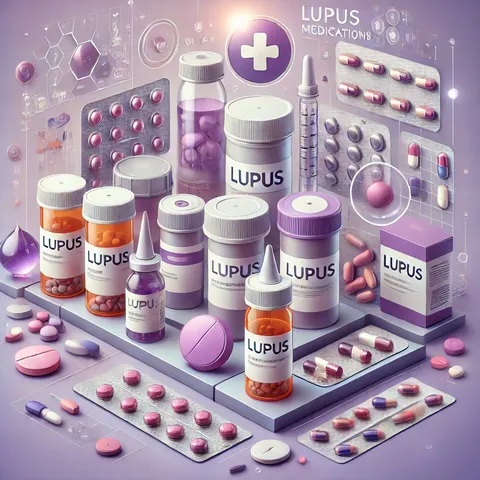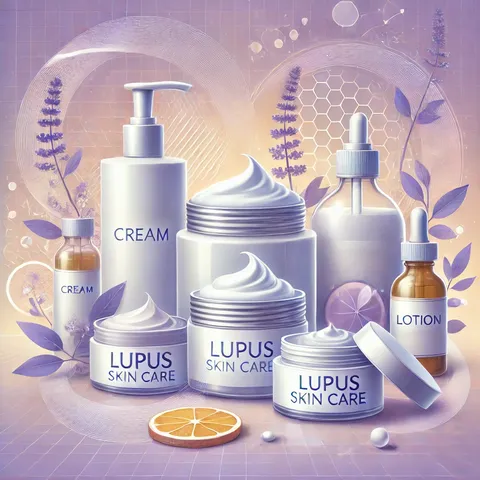Understanding Lupus Medications
Treating Lupus: Your Options
Lupus is a complex autoimmune condition that affects everyone differently. While there’s no one-size-fits-all approach, understanding your treatment options can empower you and help improve your quality of life. Below, you’ll find an overview of common lupus medications, supplements, topical treatments, and natural remedies—all aimed at easing symptoms and supporting overall well-being.

Common Lupus Medications
Plaquenil (Hydroxychloroquine Sulphate): Reduces inflammation and manages lupus symptoms.
Prednisolone: A corticosteroid that suppresses the immune system and reduces inflammation.
Mycophenolate (Myfenax): Prevents organ rejection and treats autoimmune conditions.
Metoject Injection: Used for rheumatoid arthritis, psoriasis, and psoriatic arthritis.
Methotrexate: Treats inflammatory conditions like arthritis and psoriasis.
Azathioprine: An immunosuppressant for autoimmune diseases.
Omeprazole: Protects the stomach from medication side effects by reducing acid.
Rituximab: A monoclonal antibody for autoimmune diseases and certain cancers.
Nifedipine: Manages high blood pressure and Raynaud's phenomenon.
Alendronic Acid: Prevents bone loss and treats osteoporosis.
Levothyroxine: Hormone replacement for thyroid conditions.
Furosemide: A diuretic for fluid retention management.
HS Quinoric: Similar to Plaquenil, used for lupus symptom management.
Ranitidine: Previously used for acid reduction, availability may vary.
Warfarin: An anticoagulant for blood clot prevention and treatment.
Tinzaparin Injections: Prevents blood clots as an anticoagulant.
Motilium (Domperidone): Relieves nausea and vomiting.
Escitalopram: An antidepressant for depression and anxiety. Lofepramine: Another antidepressant option available to patients.

Supplements for Lupus Management
- Calcium Carbonate: Supports bone health, crucial for those on corticosteroids.
- Vitamin D: Essential for immune function and bone health, often required by lupus patients.
- Omega-3 Fatty Acids: Helps reduce inflammation and supports heart health.
- Glucosamine: Promotes joint health, beneficial for lupus-related joint pain.
- Biotin: Supports healthy hair, skin, and nails, often affected by lupus.
- Iron Supplements: Vital for combating anemia, a common lupus symptom.
- Magnesium: Magnesium plays a critical role in muscle function, nerve signaling, and immune balance. People with lupus often have low magnesium levels, which can contribute to fatigue, muscle cramps, and sleep disturbances. Supplementing with magnesium may help relieve these symptoms and support overall well-being.
-
Vitamin Capsules (BPC): A general multivitamin supplement.
-
Dolenio: Glucosamine supplement used for joint health.
-
Calfovit D3: A supplement that combines calcium and vitamin D.
-
Coral and Silica: Supplements believed to support bone and joint health.
-
Ad-Cal: A calcium supplement used to support bone health.
-
Accrete D3: Another calcium and vitamin D supplement.
- Probiotics: Gut health is increasingly recognized as a factor in autoimmune diseases like lupus. Probiotics support a healthy gut microbiome, which can help modulate immune responses and reduce systemic inflammation. They may also assist with digestive issues, especially in those taking immunosuppressants.
-
Teromeg (Omega 3): Fish oil supplements used for overall health and to reduce inflammation.
-
Vitabiotics Ultra Vitamin D: A high-dose vitamin D supplement.
- N-Acetylcysteine (NAC): NAC is a powerful antioxidant that supports the body’s production of glutathione, a vital cellular detoxifier. Research has shown that NAC may help reduce lupus disease activity, especially fatigue, by improving mitochondrial function and reducing oxidative stress.
- Coenzyme Q10 (CoQ10): CoQ10 is a powerful antioxidant that supports energy production at the cellular level. Many people with lupus experience chronic fatigue, and CoQ10 has been shown to improve energy levels and reduce oxidative stress. It may also support heart health, which is important since lupus can increase cardiovascular risk.

Creams and Lotions for Lupus Skin Care
Cetraben: Hydrates and soothes dry, sensitive skin.
Doublebase: Effective emollient for dry skin conditions.
Uvisat: Sunscreen for sensitive skin, protects against UV rays.
Hylo-Forte Eye Drops: Provides relief for dry eyes.
Hylo-Tear Eye Drops: Moisturizes and soothes irritated eyes.
Carmize: Lubricates and comforts dry, irritated eyes.
E45 Cream: Alleviates dry, itchy skin associated with lupus.
Aveeno Lotion: Nourishes and protects sensitive skin.
Aquaphor: Restores and protects the skin barrier.
Cetaphil Moisturizer: Gentle hydration for delicate skin.
Neutrogena Hydro Boost: Locks in moisture for lasting hydration.
La Roche-Posay Lipikar Balm: Soothes and repairs dry skin.
Vanicream: Free of irritants, ideal for sensitive skin.
Avene Skin Recovery Cream: Calms and restores skin comfort.
Bioderma Atoderm: Intensely nourishes and strengthens skin.
Eucerin Advanced Repair: Provides deep hydration for dry skin.
Cerave Moisturizing Cream: Restores protective skin barrier.
Nivea Soft Cream: Lightweight, non-greasy hydration.

